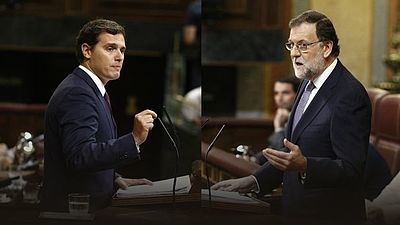
by Gabriela Taveras | Oct 5, 2016 | Slideshow |
This article was originally published in the Diplomatic Envoy by Gabriela Taveras
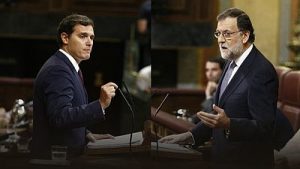
(L) Pedro Sánchez
(R) Mariano Rajoy
The Socialist Workers’ Party of Spain (PSOE) decided earlier this fall to hold a third general election next year, according to Politico.
Political gridlock has besieged the Spanish government since January. 85 members of Parliament from the PSOE have stood by their leader, Pedro Sánchez, in an attempt to remove current Prime Minister Mariano Rajoy and his Popular Party from power.
In spite of resistance, the only explanation given for what the political alternative would be to Rajoy’s party was given by Iratxe Garcia, a member of Sánchez’s leadership team. Garcia stated that his party had “nothing in common with Rajoy,” and claimed that the Popular Party (PP) was no longer a viable government option after failing to secure a majority in the last two elections, held in December then in June.
In August, Albert Rivera of the centrist Ciudadanos Party engaged Rajoy in talks concerning a potential coalition deal that would bring them up to 169 votes, or seven short of a majority. This seemingly strong union, however, would be overpowered by 180 negative votes from the PSOE and regional forces from the Basque Country and Catalonia.
If Rajoy fails to receive the 176 required votes by October 31, new elections will take place on December 25. In spite of the looming disadvantage, Ciudadanos member Ignacio Aguado considers his party as the “unblocking tool” for the country, as both the potential coalition discussed with Rajoy’s party and the agreement made with the PSOE earlier this year should make it more difficult to justify any objections during subsequent votes.
According to an opinion poll conducted by the newspaper El Mundo in August, many believe that the political gridlock was the result of the PSOE’s decades-long promotion of extreme political partisanship. The indoctrination was done through promotion of the Popular Party as a highly fascist alternative on the far right of political ideology and incompatible with the rest of Europe.
In fact, the 190,000 PSOE party members wield a power that Sánchez has benefited from in the past. For instance, in 2014, he became the first PSOE general secretary to be directly voted in by party members, a rare accomplishment among Spanish political parties.
Because of this political favor, Sánchez has used his opposition to Rajoy to grow even more popular with his party’s membership, said Lucia Mendez, a political analyst for El Mundo.
To avoid that scenario, El Mundo says that Rajoy will have to propose a viable alternative coalition before October 31. There are multiple options he would have to consider, including re-evaluating a three-way deal with Podemos and Ciudadanos, with whom he shares a common vision to combat corruption; striking a deal with the re-founded Partit Demòcrata Català, the party of Carles Puigdemont, president of the Catalan region; or collaborating with the Basque Nationalist Party (PNV), which is currently in power with PSOE support.
On the other hand, if Rajoy decides to join a coalition with the Basque PNV, he would have 175 seats. This would leave him and the PP at one seat short of an overall majority, and would represent a considerable disadvantage toward the PSOE’s goal of forming a viable coalition. The longer it takes Sánchez and his party leadership to decide their next move, the likelier it seems that the holiday bells will not toll in their favor.
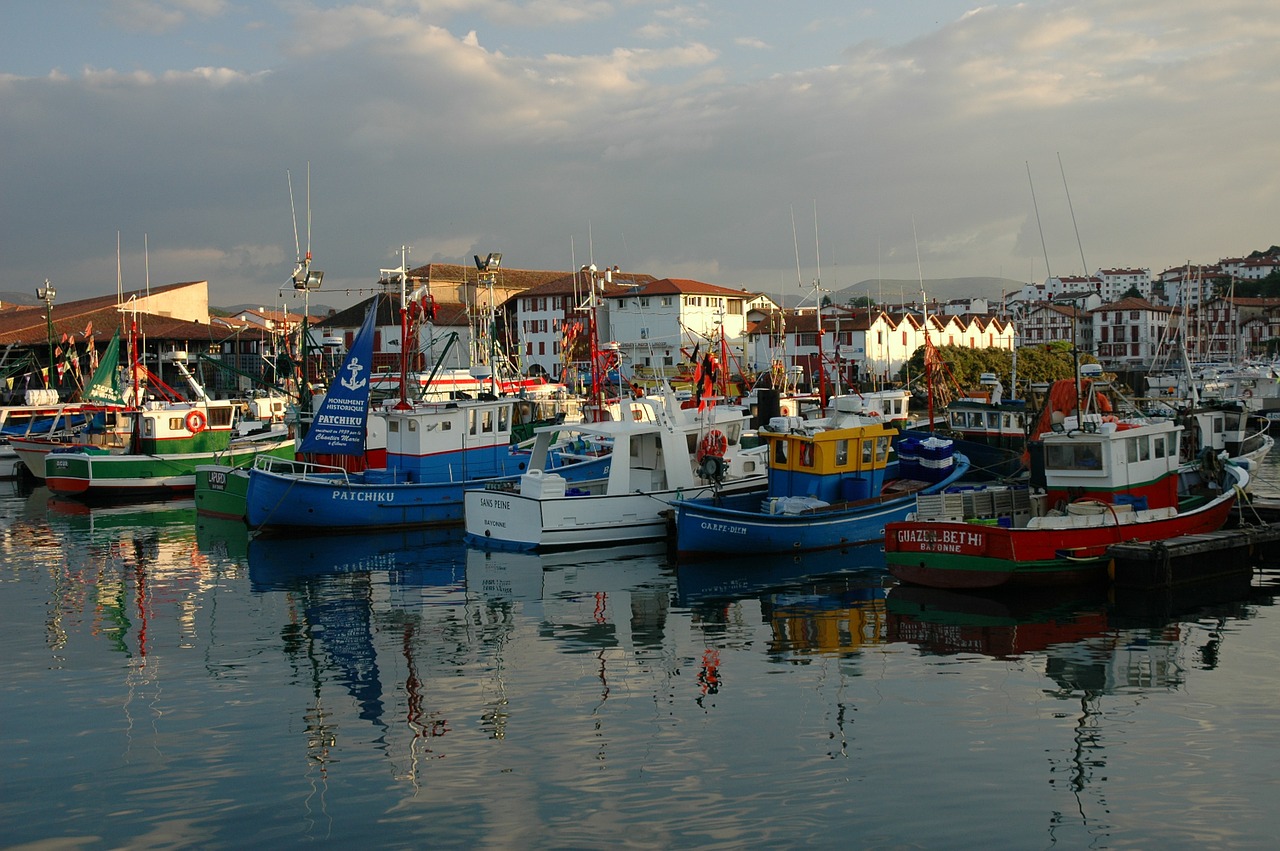
by Gabriela Taveras | Jul 14, 2016 | Slideshow |
If we consider the ongoing wars around the world, the question arises if the promise of “never again” has fallen, once more, on deaf ears, threatening to drown out the cries for help of those who continue to suffer, especially the 19.5 million refugees pleading for compassion and salvation worldwide.
We have all heard the old adage: to think globally, and act locally. With this in mind, the Basque Country, in spite of its limited territory, has taken the initiative to alleviate the suffering of those who have fled from everything they have ever known, all in hopes of seeking better destinies in new, unknown lands.
Last year, the Basque Government donated US $257,000 to the UN Relief and Work Agency’s Syria’s Response Plan. Justice counselor and Basque Government Speaker, Josu Erkoreka, announced in September of 2015 that the Basque Country would accept 1,000 refugees over the next two years. Currently, 3 Eritrean refugees are safely residing in Bilbao. According to the quota plan, Bizkaia, Gipuzkoa and Alava will accept 52%, 33% and 15% of refugees that enter Spain, respectively.
Furthermore, the Commission for the Aid of the Refugee in Euskadi (CEAR) has assumed responsibility for the three Eritreans and most of the ongoing refugee asylum cases. Caritas Internationalis, Red Cross and Accem have also agreed to aid them as they transition to a lifestyle in the Basque Country. Social, legal and professional support is available to them onsite, and up until the moment they are fully independent, if they so desire.
Although the Basque Country is known as a land that is proud and deeply nationalistic, in 2003, the Basque Ministry of Housing and Social Affairs released the first Basque Immigration Plan (PVI), signaling the government’s intent to be active in structuring the integration process of foreigners arriving in the Basque Country.
Based on this law, refugees have to undergo a thorough medical examination and will receive temporal housing. Additionally, their educational and legal needs will be covered, with volunteers mostly hailing from the CEAR aiding in this process. According to Teresa Laespada, Bizkaia’s Coordinator for Social Inclusion and Equality, the province has 150 lodging quarters and 500,000 euros available for the aid of refugees.
A main ideological premise of the PVI is the concept of Basque citizenship based on jus domicile – citizenship by residence – to extend equality of civil, social, economic, and cultural rights to everyone, regardless of their place of origin or legality, according to the Spanish immigration law. This is a testament to the Basque society’s cultural and political transformation. Even though only 2.10% of the upwards 4 million foreigners living in Spain reside in the Basque Country, the aforementioned legislatures and integration plans are only part of what underlines the territory’s ongoing progressive path. In 2001, the Basque Country founded a bureau dedicated to the territory’s immigration affairs, under the jurisdiction of the Department of Housing and Social Affairs. This office has set up programs to promote intercultural coexistence, the social participation of immigrants, and Adult Education Centers with free courses on the Basque language, Euskera.
Some associations of the Basque Country, among them SOS Racismo, organize campaigns requesting the recognition of immigrants through political participation in their towns of adoption as a way of making them full citizens.
In conclusion, it is important to stress that solving conflict does not lie in mindlessly dispensing aid to those in need, but in empowering and giving them the tools so they can take back the life and dignity that they lost in the throes of conflict. After all, as expressed by António Guterres, the United Nations High Commissioner for Refugees: “What is at stake is nothing less than the survival and well-being of a generation of innocents”, a generation whose downfall will haunt those who could have done something, but refused to.
by Felipe Bueno | Apr 20, 2016 | events, Feature Stories, Features |
The Center for Peace and Conflict Studies at Seton Hall University held a two-day conference on April 4-5 called “All Conflict is Local: Personal Experience, Reflection, and Conflict Resolution.” This conference was a unique opportunity for students studying conflict and post-conflict reconstruction to present their research to the Seton Hall community.
The conference w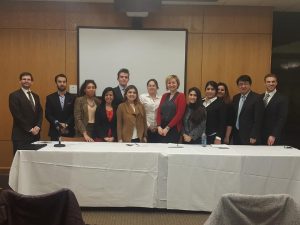 as organized by Dr. Zheng Wang, director of the Center for Peace and Conflict Studies, a specialist in global negotiation and conflict management, and an expert on the Asia-Pacific region.
as organized by Dr. Zheng Wang, director of the Center for Peace and Conflict Studies, a specialist in global negotiation and conflict management, and an expert on the Asia-Pacific region.
Dr. Wang was inspired by the Global Conflict Resolution and Peacebuilding course he is teaching this semester, and stressed to the students, “This is your conference.” He emphasized that the conflict is real for many people and there is a value in stories of conflict of those who experienced it.
The first day of presentations began with opening remarks by Dean Andrea Bartoli, who commended Dr. Wang for the creativity of the conference. Four panelists presented their work on the localized conflicts occurring in all parts of Africa. “Conversation is dangerous,” stated Dean Bartoli, “but injustices must be discussed for the sake of the victims to conflict, and for the betterment of society.”
(more…)
by Borislava Manojlovic | Apr 14, 2016 | events, Feature Stories, Features |
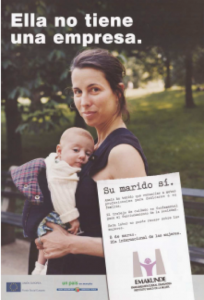 The School of Diplomacy together with the Basque Government Office in NYC has launched an exhibition “Changing Perspectives” on the three decades of work of the Basque Institute for Women – Emakunde. The exhibition is included in the Seton Hall University’ Petersheim expo and it represents the School’s continued efforts to develop partnerships with academic institutions, government, think tanks and civil society of the Basque Country. It features posters depicting various campaigns and work of Emakunde.
The School of Diplomacy together with the Basque Government Office in NYC has launched an exhibition “Changing Perspectives” on the three decades of work of the Basque Institute for Women – Emakunde. The exhibition is included in the Seton Hall University’ Petersheim expo and it represents the School’s continued efforts to develop partnerships with academic institutions, government, think tanks and civil society of the Basque Country. It features posters depicting various campaigns and work of Emakunde.
Emakunde was created in 1988 as the Basque Institute for Women. It was awarded the 2015 United Nations Public Service Award for “Promoting Gender Responsive Delivery of Public Services”. As an autonomous body of the Basque Government, Emakunde has promoted and led the process of development, implementation and evaluation the equality policies of women and men in the Basque Autonomous Community 1988 including the Law for Equality between Men and Women passed in 2005. For the last 28 years, Emakunde has launched several awareness campaigns about equality between women and men in different areas of life, often making the invisible visible. The goal of the exhibition is to commemorate Women’s History Month, an annual declared month that highlights the contributions of women to events in history and contemporary society, through sharing images and messages of Emakunde’s campaigns that have helped transform the way Basque society sees and experiences the Basque Country and the world in terms of gender equality. The exhibition will be hosted by the School of Diplomacy and International Relations from April 12 -30, 2016.
by Borislava Manojlovic | Feb 3, 2016 | Blog, events, Research Team, Slideshow |
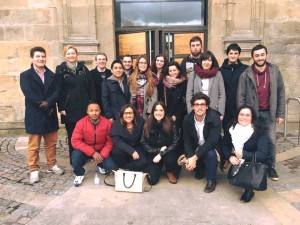 In January 2016, Dr. Borislava Manojlovic led a team of students in an immersive study abroad trip to the Basque Country, Spain. The course, titled “Memory and Conflict: Dealing with the Past Constructively,” allowed students to discover how different actors and institutions address processes of dealing with the region’s contentious past through education, justice, policymaking, and art.
In January 2016, Dr. Borislava Manojlovic led a team of students in an immersive study abroad trip to the Basque Country, Spain. The course, titled “Memory and Conflict: Dealing with the Past Constructively,” allowed students to discover how different actors and institutions address processes of dealing with the region’s contentious past through education, justice, policymaking, and art.
The Basque Country has experienced protracted conflict described as “Europe’s longest war” with roots that can be traced to the time of Spanish Civil War and before. The Basque Study Abroad trip explored the consequences of the conflict and steps that are being taken to help spur the reconciliation process.
(more…)
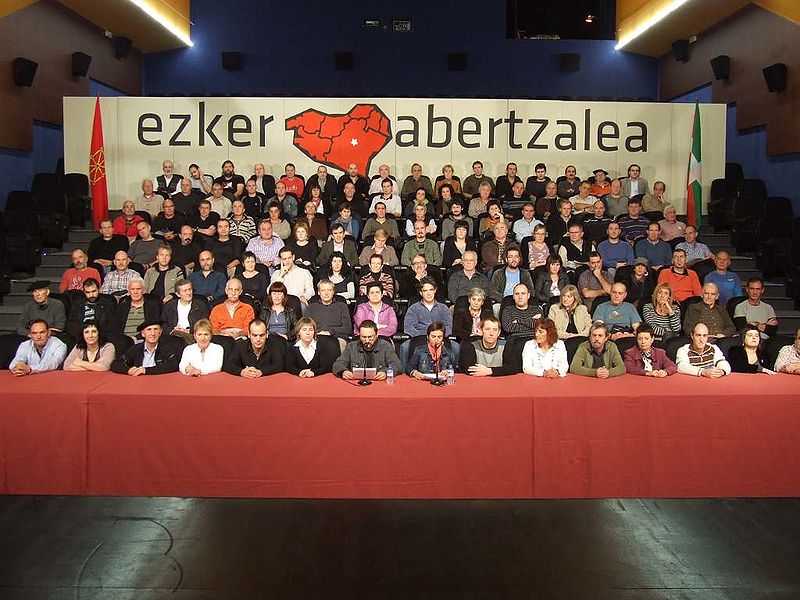
by Tatum Haberman | Dec 17, 2015 | Slideshow |
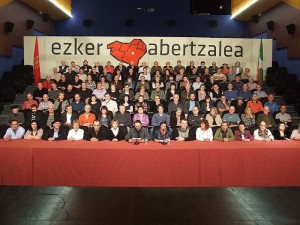 In 2009 the Abertzale Left’s announcement of their unilateral decision for peace in what is considered Europe’s longest war was a major turning point for the Basque people. [i] A domino effect began as terrorist group, Euskadi ta Askatasuna (ETA), declared a ceasefire on 20 October 2011. The Aiete Declaration (October 2011), Civil Society Forum (March 2013), ETA’s definitive ceasefire, and the Brussel’s Declaration (March 2010) have recently set the scene for the success of peace throughout the Basque Region. The international community’s support makes this reconciliation process obtainable in the near future. The only piece of this puzzle that remains absent is the involvement of the French and Spanish governments in the peace discussions of this post-conflict region.
In 2009 the Abertzale Left’s announcement of their unilateral decision for peace in what is considered Europe’s longest war was a major turning point for the Basque people. [i] A domino effect began as terrorist group, Euskadi ta Askatasuna (ETA), declared a ceasefire on 20 October 2011. The Aiete Declaration (October 2011), Civil Society Forum (March 2013), ETA’s definitive ceasefire, and the Brussel’s Declaration (March 2010) have recently set the scene for the success of peace throughout the Basque Region. The international community’s support makes this reconciliation process obtainable in the near future. The only piece of this puzzle that remains absent is the involvement of the French and Spanish governments in the peace discussions of this post-conflict region.
The Basque’s Progress
The Civil Society Forum was created in March 2013.[ii] The absence of a dialogue between the Basque people, Spanish government, and French government ignited the creation of this unilateral Basque Forum. The forum includes diverse individuals from the Basque Region of all different specialties. The organization “was created by Lokarri, Red ciudadana por la paz (Citizens’ Network for Peace), Bake Bidea (a peace organization in the French Basque Country), Ahotsak (a network of political women who work on the peace process), and groups of young people of all ideologies”. [iii] This diversity allows for more creativity when it comes to keeping peace in the Basque Region and continuing the nonviolent fight for the Basque culture. This forum has worked on topics such as ETA’s prisoner policies, ETA’s disarmament, and using tools such as negotiations instead of violence to resolve issues between these people, while still promoting an adequate amount of nationalism. The Basque people have put an emphasis on empowering the citizens to work towards their goals of autonomy in a peaceful manner, as well as keeping the pressure on ETA to remain loyal to their ceasefire. Basque nationalist’s peaceful protests before events such as the trial for the thirty-five accused separatists have set the stage for peace in this post-conflict area.[iv]
ONE Big Global Community
Humanity’s evolution has brought us away from the Hobbesian mentality of all-out war against all but one’s own entity. Instead, the growing interdependence of the global economies and the environment force individual states, nations, groups, and individuals to work together for the good of all people. The Basque’s Civil Society Forum, Brussels Declaration, Declaration of Aiete, and PODEMOS movement give hope to the possibility of world peace. 5[v] The youth around the world is becoming more involved in working towards this peace and reconciliation of post-conflict areas. It is imperative that this drive continues and grows stronger in the upcoming years. Peace in the near future would mean less violence and more progression for the adolescence. Today’s modern technological advances have increased the severity of war, thus making this transition imperative.
It Only Takes ONE
“We Can” says Pablo Iglesias in his left-wing political party, PODEMOS that was recently formed in March of 2014. Only thirty-six years old, Iglesias has created a powerful movement of a need for peace in a democratic state and has inspired civil empowerment throughout the Iberian Peninsula. His youth has encouraged many others of all ages to reach out and do more for the community. It proves to the people of Spain that change is possible. The common individual needs to take initiative and act, just as those in the Basque community have in movements such as their Civil Society Forum.
The Next Steps?
Individuals need to take responsibility for their fellow neighbors to assure the fair treatment of all people is carried out. Organizations such as the Basque Agency for Gender Equality are on the right path towards this goal of reconciliation and fair treatment of all people. [vi] The root of the issue lies beneath the long history of struggle in the Basque region. The legacy of violence has been influenced by the Spanish Civil War, Franco regime, and the resulting formation of ETA. Because of this, the reconciliation process must begin with an open mind and putting an end to the conflict system mentality that pins people against each other. Both sides of the issue need to be addressed. When both sides of a conflict are taken into consideration, a fair compromise can be met. Continuing to put pressure on the Spanish and French governments to involve themselves in the reconciliation process is vital. A change begins with the individual. As Pablo Iglesias has shown, one person can make a great difference. It is when these people are united together that change will result.
[i] Political parties that support Basque independence and a range of ideologies from communism to social democracy
[ii] “Introduction [to Basque Peace Process].” Basque Peace Process. N.p., n.d. Web.
[iii] Rios, Paul. “Basque Country Experiences of the Social Forum to Invigorate Peace.” (n.d.): n. pag. Conciliation Resources. Web.
[iv] Boutreux, Laurence. “35 Basque Separatists Go on Trial in Spain.” N.p., 3 Dec. 2015. Web.
[v] “Brussel Declaration, Statement by International Leaders in Conflict Resolution and Peace Processes | Basque Peace Process.” Basque Peace Process. N.p., n.d. Web. 08 Dec. 2015.
“Proposals | Basque Peace Process.” Basque Peace Process. N.p., n.d. Web. 08 Dec. 2015. <http://www.basquepeaceprocess.info/proposals/>.
“What Is Podemos?” Podemos London Circle. N.p., 12 Apr. 2014. Web. 08 Dec. 2015.
[vi] Potter, Michael. “Emakunde: The Gender Equality Institution in the Basque Country.” Emakunde: The Gender Equality Institution in the Basque Country (n.d.): n. pag. Web.




 as organized by Dr. Zheng Wang, director of the Center for Peace and Conflict Studies, a specialist in global negotiation and conflict management, and an expert on the Asia-Pacific region.
as organized by Dr. Zheng Wang, director of the Center for Peace and Conflict Studies, a specialist in global negotiation and conflict management, and an expert on the Asia-Pacific region. The School of Diplomacy together with the Basque Government Office in NYC has launched an exhibition “Changing Perspectives” on the three decades of work of the Basque Institute for Women – Emakunde. The exhibition is included in the Seton Hall University’ Petersheim expo and it represents the School’s continued efforts to develop partnerships with academic institutions, government, think tanks and civil society of the Basque Country. It features posters depicting various campaigns and work of Emakunde.
The School of Diplomacy together with the Basque Government Office in NYC has launched an exhibition “Changing Perspectives” on the three decades of work of the Basque Institute for Women – Emakunde. The exhibition is included in the Seton Hall University’ Petersheim expo and it represents the School’s continued efforts to develop partnerships with academic institutions, government, think tanks and civil society of the Basque Country. It features posters depicting various campaigns and work of Emakunde. In January 2016, Dr. Borislava Manojlovic led a team of students in an immersive study abroad trip to the Basque Country, Spain. The course, titled “Memory and Conflict: Dealing with the Past Constructively,” allowed students to discover how different actors and institutions address processes of dealing with the region’s contentious past through education, justice, policymaking, and art.
In January 2016, Dr. Borislava Manojlovic led a team of students in an immersive study abroad trip to the Basque Country, Spain. The course, titled “Memory and Conflict: Dealing with the Past Constructively,” allowed students to discover how different actors and institutions address processes of dealing with the region’s contentious past through education, justice, policymaking, and art.
 In 2009 the Abertzale Left’s announcement of their unilateral decision for peace in what is considered Europe’s longest war was a major turning point for the Basque people.
In 2009 the Abertzale Left’s announcement of their unilateral decision for peace in what is considered Europe’s longest war was a major turning point for the Basque people.